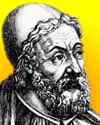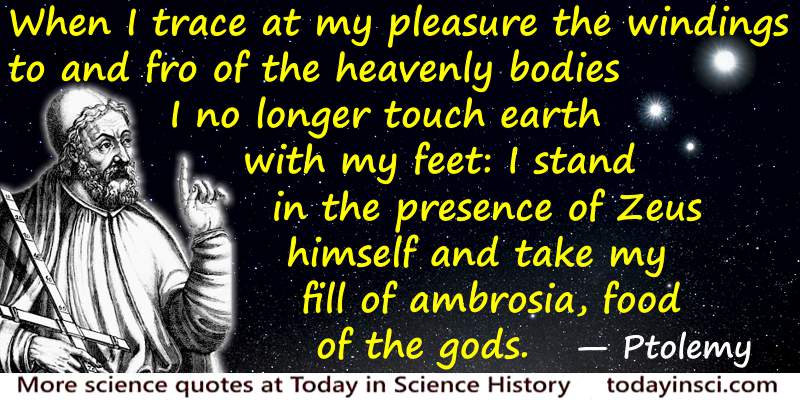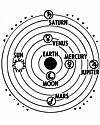Today in Science History - Quickie Quiz

|
Ptolemy
(c. 100 - c. 170)
Greek astronomer who wrote the famous book of mathematical astronomy, known as the Almagest, which described the Ptolemaic (geocentric) universe.
|
Ptolemy
“When I trace at my pleasure the windings”
Illustrated Quote - Large (800 x 400 px)

Conjunction of the moon, Venus and Jupiter
(source)
“When I trace at my pleasure the windings to and fro of the heavenly bodies I no longer touch earth with my feet: I stand in the presence of Zeus himself.”
— Ptolemy
Translation of epigraph opening the Almagest.
Neil DeGrasse Tyson used a longer version of this quote by Ptolemy in a magazine article he wrote1. He gave examples of scientists in centuries past reaching the boundary where their understanding fades to ignorance. At that point, as Tyson points out, the scientist faces a choice: “invoke a deity or continue the quest for knowledge.” He gives as an example:
“Consider the second-century a.d. Alexandrian astronomer Ptolemy. Armed with a description, but no real understanding, of what the planets were doing up there, he could not contain his religious fervor:
I know that I am mortal by nature, and ephemeral; but when I trace at my pleasure the windings to and fro of the heavenly bodies I no longer touch earth with my feet: I stand in the presence of Zeus himself and take my fill of ambrosia, food of the gods.
As with anything Neil Degrasse Tyson writes, the whole article is worth reading. He includes further examples of scientists making a divine invocation to the “God of the Gaps,” namely: Isaac Newton, Pierre-Simon de Laplace, Christiaan Huygens, and Galileo. He closes with his own commentary on “Science is a philosophy of discovery,” and we sit in awe as others “boldly go where no mortal has gone before.”
1 'The Perimeter of Ignorance',
Natural History (1 Nov 2005)
(source) .
Text by Webmaster, with quotes from Neil DeGrasse Tyson article given in footnote. The subject quote is a translation of the epigraph opening Ptolemy’s book, the
Almagest. It can also be found quoted in various books, for example, in Dava Sobel,
The Planets (2005), 33.
(source)See also:
- Science Quotes by Ptolemy.
-
Ptolemy - biography from Great Astronomers (1895)
-
Ptolemy - context of quote “When I trace at my pleasure the windings” - Medium image (500 x 250 px)
- Ptolemy’s Almagest, by Ptolemy translated by G.J. Toomer. - book suggestion.
- Booklist for Ptolemy.
Nature bears long with those who wrong her. She is patient under abuse. But when abuse has gone too far, when the time of reckoning finally comes, she is equally slow to be appeased and to turn away her wrath. (1882) --
Nathaniel Egleston, who was writing then about deforestation, but speaks equally well about the danger of climate change today.
 Carl Sagan
Carl Sagan: In science it often happens that scientists say, 'You know that's a really good argument; my position is mistaken,' and then they would actually change their minds and you never hear that old view from them again. They really do it. It doesn't happen as often as it should, because scientists are human and change is sometimes painful. But it happens every day. I cannot recall the last time something like that happened in politics or religion. (1987) ...
(more by Sagan) Albert Einstein: I used to wonder how it comes about that the electron is negative. Negative-positive—these are perfectly symmetric in physics. There is no reason whatever to prefer one to the other. Then why is the electron negative? I thought about this for a long time and at last all I could think was “It won the fight!” ...
(more by Einstein) Richard Feynman: It is the facts that matter, not the proofs. Physics can progress without the proofs, but we can't go on without the facts ... if the facts are right, then the proofs are a matter of playing around with the algebra correctly. ...
(more by Feynman)







